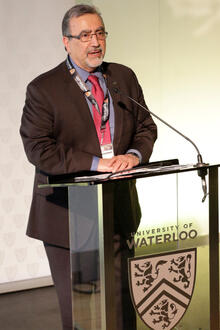
Waterloo kicks off True North Conference
Three-day gathering discusses future of technology and society’s place in it.

Three-day gathering discusses future of technology and society’s place in it.
By Natalie Quinlan University RelationsTechnology is inevitable, but what does it mean to be human in a tech-driven world?
That’s the question True North will answer, a three-day conversation (May 29 – 31) focused on the intersection of humans and technology.
 As title sponsor, the University of Waterloo kicked off its first day by greeting more than 150 guest groups to a panel discussion on Waterloo’s significance to the success of the innovation ecosystem (both locally and globally), a networking breakout session for bright minds to come together, and an interactive experience featuring cutting-edge content on quantum technology and thinking.
As title sponsor, the University of Waterloo kicked off its first day by greeting more than 150 guest groups to a panel discussion on Waterloo’s significance to the success of the innovation ecosystem (both locally and globally), a networking breakout session for bright minds to come together, and an interactive experience featuring cutting-edge content on quantum technology and thinking.
 “This important foundation and partnership sparked six decades of innovation backed by exceptional academics, research and the world’s largest experiential learning program,” said Feridun Hamdullahpur, president and vice-chancellor. “This environment has produced global enterprises and global talent that has reshaped industries and is already impacting the future of the new economy.”
“This important foundation and partnership sparked six decades of innovation backed by exceptional academics, research and the world’s largest experiential learning program,” said Feridun Hamdullahpur, president and vice-chancellor. “This environment has produced global enterprises and global talent that has reshaped industries and is already impacting the future of the new economy.”
True North is a meeting of the minds celebrated in partnership with Communitech.

Read more
Alum and founder Marc Lafleur shares how his entrepreneurship playbook has changed since selling his first company

Read more
How Doug Kavanagh’s software engineering degree laid the foundation for a thriving career in patient care

Read more
Upside Robotics secures new funding to accelerate the future of sustainable farming
The University of Waterloo acknowledges that much of our work takes place on the traditional territory of the Neutral, Anishinaabeg, and Haudenosaunee peoples. Our main campus is situated on the Haldimand Tract, the land granted to the Six Nations that includes six miles on each side of the Grand River. Our active work toward reconciliation takes place across our campuses through research, learning, teaching, and community building, and is co-ordinated within the Office of Indigenous Relations.